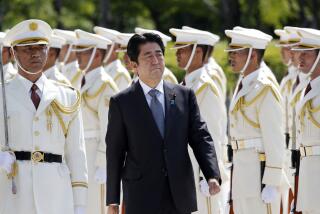Latest Japan Stock Plan Is Derided
- Share via
TOKYO — After a global stock rout had spread from continent to continent this week, Japan sought Thursday to apply the brakes with a predictable set of tools: a committee and a vaguely worded plan.
Politically embattled Prime Minister Yoshiro Mori convened an emergency task force on Japan’s sagging stock market, weak economy and rising banking problems as mounting domestic and international pressure to take action increased. The meeting ended without a decision, reportedly after members failed to agree on what steps were needed.
After the meeting, however, the government released word that Finance Minister Kiichi Miyazawa had a plan under which the government would guarantee a fund charged with buying battered stocks from banks.
Details were scarce, including when and under what conditions buying might take place, the sums involved or the potential impact on the government’s already-stretched debt rating. But as outlined, a private-sector fund would buy so-called cross-held shares, with the government acting as guarantor. These days, Japanese banks are in the process of selling long-held shares in affiliated companies, fueling lower share prices.
The market apparently liked the news, along with an announcement that three major banks planned to write off a combined $9.2 billion in bad debts. The Nikkei stock index advanced 309.24 points, or 2.61%, to 12,152.83.
The problem with the latest plan, economists say, is that it represents more intervention in the marketplace by the Japanese government, albeit in a way that makes it less obvious that taxpayer money is at risk. The primary motivation, they add, is to do some damage control before elections in July, not to deal with Japan’s core structural problems.
“This is a bad idea; it’s all political,” said Junichi Makino, economist with Daiwa Research Institute. “They’re not letting the market work.” Makino had equally harsh words for Japanese investors who seemed at least temporarily taken in by the approach.
Furthermore, the bigger problem is the festering bad debt held by banks and companies across the economic landscape, economists say.
“Japan needs to do major surgery to remove the cancer,” said Yukio Suzuki, an economics professor at Reitaku University. “Instead, the Japanese government seems content to remove the tissue near the cancer without cutting out the cancer itself.”
If Japan really wants to address the debt problem plaguing its banks, it needs to sell the loans--and all the empty shopping centers, dowdy apartment buildings and badly managed companies they represent--to independent third parties, who could then dispose of the bad assets as they see fit, experts say.
This is important because it would allow the bad assets to fall to their real value, not remain at some fictional price they had a decade ago. It is reminiscent of what the Resolution Trust Corp. did when it bought and resold assets held by U.S. savings and loan institutions a decade ago.
“Then you can get to the point where capital is actually deployed efficiently again,” said Michael Taylor, chief economist with Indosuez W.I. Carr Securities. “Otherwise, how can you start to change corporate practices.”
The primary reason Japan is reluctant to take such a step is the high social cost in a nation with less crime, better income distribution and healthier citizens than many of its Western counterparts. Marking down asset prices would quickly lead to the shuttering of ill-conceived ventures and inefficient factories, pushing more people out of work and creating more family problems--an outcome Japan and its political leaders have tried for a decade to avoid.
“The Japanese government just keeps pushing problems into the future,” said Hiroshi Sakurai, an economist with Mizuho Investors. “This Miyazawa plan is just a waste of taxpayer money.”
Eroded investor confidence in Japanese economic policy also affects stock prices.
“Every time it gets down to a crisis, [the bureaucrats] do something incremental to try and get away from the fire,” said Vincent Musumeci, an economist with ABN Amro. “But the problems remain.”
*
Rie Sasaki in The Times’ Tokyo Bureau contributed to this report.
More to Read
Sign up for Essential California
The most important California stories and recommendations in your inbox every morning.
You may occasionally receive promotional content from the Los Angeles Times.













